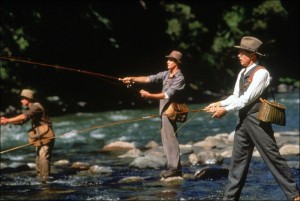From the Prophet Jeremiah:
I am now sending for many fishermen, says the Lord, and they shall catch them; and afterwards I will send for many hunters, and they shall hunt them from every mountain and every hill, and out of the clefts of the rocks. For my eyes are on all their ways; they are not hidden from my presence, nor is their iniquity concealed from my sight. And I will doubly repay their iniquity and their sin, because they have polluted my land with the carcasses of their detestable idols, and have filled my inheritance with their abominations.
(From the Daily Office Lectionary – Jeremiah 16:16-18 (NRSV) – March 11, 2013.)
 I wonder if Jesus had this prophecy in mind when he called Andrew and Peter and said to them, “Follow me, and I will make you fish for people.” (Matt. 4:19)
I wonder if Jesus had this prophecy in mind when he called Andrew and Peter and said to them, “Follow me, and I will make you fish for people.” (Matt. 4:19)
When we modern, urban Americans read biblical references to fishermen, I suspect that a majority of us picture someone sitting lazily on the banks of a river with a pole stuck in the soil next to them, a line trailing off to a bobbing float; or perhaps we imagine Tom Skerrit standing in the Blackfoot River casting hand-tied flies trying to snag a large trout. Although hook-and-line fishing was not unknown in the ancient world, it was then, as now, a recreational sort of fishing. When God says through Jeremiah that he is sending fishermen to catch the wayward people of Israel, when Jesus tells his new disciples that they will become fishers of people, the reference is a very different sort of fishing.
The image we should have is of net fishing, probably using either a dragnet or a cast net. The dragnet is one of the oldest of fishing dating from the third millennium B.C. in Egypt. The dragnet, perhaps 250 to 300 yards long, and varing in height from 3 to 8 yards, would be taken out from the shore by boat which would proceed straight out for a distance, then turn parallel to the shore for a bit, and then turn back to the shore. The bottom of the net would be weighted with sinkers, and the top would have cork floats attached. Tow lines attached to each end of the net were hauled in by a teams of sixteen men for large nets, fewer for for smaller nets. This method of fishing is described in the books of Habakkuk, Ezekiel, and Matthew.
A cast net was, as the name suggests, thrown or cast onto the waters by one man either from shore or from a boat. After it had sunk to the bottom, trapping fish within it, the caster and others would dive down to it and either retrieve the fish individually placing them into pouches, or they would gather the footrope of the net, gathering the fish into a sort of purse formed by the net and bring them up together.
In either event, the picture we get is of teamwork. Biblical fishing was a community activity, something that required cooperation to be effective. So, although God promised to send a single shepherd, the Messiah, God in this prophecy of Jeremiah also promised to send a working party.
And, one wonders, who might that be? The church? All the baptized? No doubt. God’s team is made up of the spiritual descendants of the ones to whom Jesus said, “Follow me, and I will make you fish for people.” Midway through Lent as we are, this might be a good time to turn from individual self-examination and consider how well we are doing as a community of fishers.
====================
A request to my readers: I’m trying to build the readership of this blog and I’d very much appreciate your help in doing so. If you find something here that is of value, please share it with others. If you are on Facebook, “like” the posts on your page so others can see them. If you are following me on Twitter, please “retweet” the notices of these meditations. If you have a blog of your own, please include mine in your links (a favor I will gladly reciprocate). Many thanks!
====================
Father Funston is the rector of St. Paul’s Episcopal Church, Medina, Ohio.



Leave a Reply